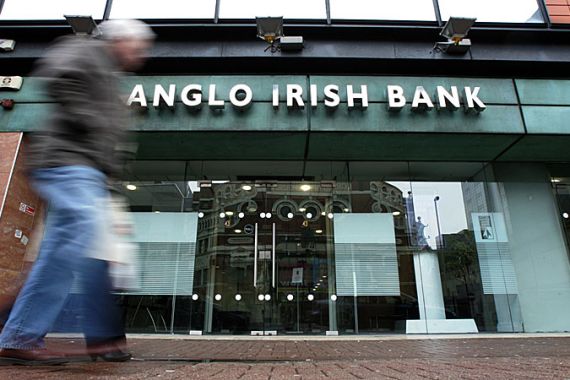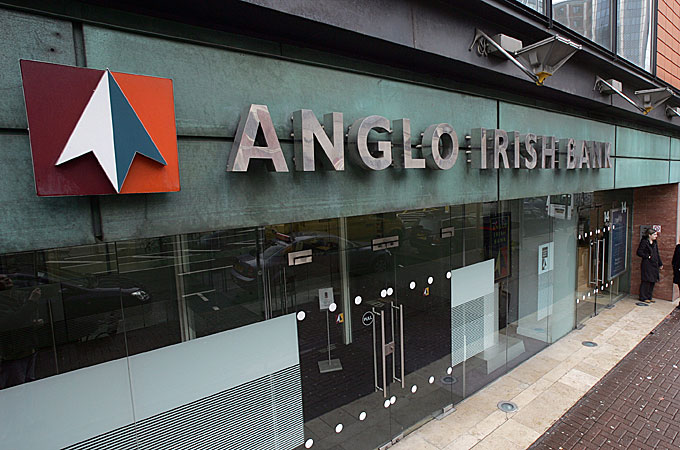Ireland faces huge banking bailout
Debt-laden nation reveals banking sector rescue could cost $68bn, pushing public deficit up to 30 per cent of GDP.

 |
| It could cost up to $46.7bn to bail out the Anglo Irish Bank, which helped fuel a property boom before going bust [EPA] |
Ireland could spend more than $68bn rescuing its banks, pushing the country’s public deficit up to around 30 per cent of economic output this year, the government announces on Thursday.
Brian Lenihan, the country’s finance minister, revealed the full extent of the country’s massive banking sector losses, after the central bank said it would cost up to $46.7bn just to bail out the Anglo Irish bank.
Keep reading
list of 4 itemsBoeing hit with 32 whistleblower claims, as dead worker’s case reviewed
US imposes new sanctions on Iran after attack on Israel
A flash flood and a quiet sale highlight India’s Sikkim’s hydro problems
The government had previously put the bailout for the bank at an estimated $34bn.
Lenihan said Irish people were “entitled to be angry” with the bankers that “lent recklessly over a considerable period of time.”
“It’s clear that these losses were installed in our banking system, in some of the banks, by the middle of the decade, and it’s clear that some of the banks spent a considerable period of time trying to conceal the existence of these losses.”
The minister pointed to one bank whose failure represented a national financial risk.
“In particular, Anglo Irish developed to a size where its balance sheet, its annual turnover, was half the national wealth and it became in itself a systemic threat to the financial viability of the state.
“That particular nightmare, the government has had to live with, the Irish people have had to live with, and I’ve had to live with since September 2008. We’re now bringing closure to that,” he said.
Debt challenges
Anglo Irish was one of the banks that helped fuel a property boom in Ireland, which went bust as the eurozone country’s banking sector was ravaged by the global financial crisis and a deep recession.
Lenihan also said that Ireland would give $4.1bn more to Allied Irish, and $3.7bn to another nationalised bank, Irish Nationwide.
The European Union’s competition chief welcomed Ireland’s “clarity” over the figures.
“I welcome the statement on banking which brings clarity with regard to the remaining transfer of assets to [the National Asset Management Agency] and the capital needs of some banks and building societies,” Joaquin Almunia said statement.
“Concerning Anglo-Irish Bank, from a competition point of view, it is clear that the foreseen restructuring and resolution of the bank addresses competition distortions created by the large amounts of aid at stake,” he said.
The “Celtic Tiger” that was once the EU’s fastest-growing economy is now likely to be burdened by a massive public debt.
But Lenihan said Dublin remained committed to reducing the deficit below the EU limit of 3 percent of gross domestic product by 2014 and would outline a four-year budget plan in early November as sought by Brussels.
Jean-Claude Juncker, Eurogroup chief at the EU said Ireland could beat its banking crisis, adding he did not think it would require help from the bloc’s rescue fund.
“I don’t think that Ireland will need to take refuge under the European umbrella,” Juncker told reporters before a meeting of finance ministers in Brussels, the Belgian capital, on Thursday.
“We believe the Irish government can resolve its banking problems without the rescue fund.”
European governments and the International Monetary Fund have set up a trillion-dollar warchest to help any eurozone state in fiscal trouble following the financial rescue of Greece in May.